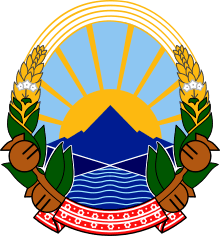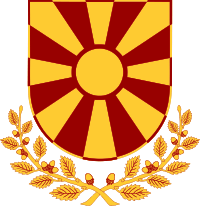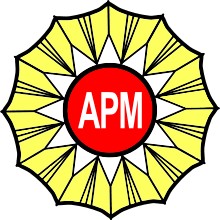Politics of the Republic of Macedonia
 |
|---|
| This article is part of a series on the politics and government of the Republic of Macedonia |
|
Executive |
|
Legislature |
Politics in the Republic of Macedonia occur within the framework of a parliamentary representative democratic republic, whereby the Prime Minister is the head of government, and of a multi-party system. Executive power is exercised by the government. Legislative power is vested in both the government and parliament. The Judiciary is independent of the executive and the legislature. The Economist Intelligence Unit has rated Macedonia as "hybrid regime" in 2016.[1]
Political system
The political system of the Republic of Macedonia consists of three branches: Legislative, Executive and Judicial. The Constitution[2] is the highest law of the country. The political institutions are constituted by the will of its citizens by secret ballot at direct and general elections. Its political system of parliamentary democracy was established with the Constitution of 1991, which stipulates the basic principles of democracy and guarantees democratic civil freedom. The Elections for Representatives in the Assembly of the Republic of Macedonia is held in October. The Assembly is composed of 123 Representatives, who are elected for a period of four years. Out of this number, 120 are elected proportionally in 6 constituencies of 20 each, and 3 according to the majority principle, specifically for the diaspora (depending on turnout) (the territory of the Republic of Macedonia representing one constituency). There are approximately 1.5 million voters registered in the General Electoral Roll for the election of Representatives in the Assembly of the Republic of Macedonia in 2.973 polling stations[?]. The voting for the representatives is conducted according to the list system.[3]
Presidents
- Kiro Gligorov (1991–1999)
- Boris Trajkovski (1999–2004)
- Branko Crvenkovski (2004–2009)
- Gjorge Ivanov (2009–present)
Executive branch
| Office | Name | Party | Since |
|---|---|---|---|
| President | Gjorge Ivanov | VMRO-DPMNE | 12 May 2009 |
| Prime Minister | Zoran Zaev | SDSM | 31 May 2017 |
Although in Macedonian, these roles have very similar titles (Претседател на Република Македонија "President of the Republic of Macedonia" and Претседател на Владата на Република Македонија "President of the Government of the Republic of Macedonia") it is much less confusing to refer to them in English as President and Prime Minister respectively. These are also the terms used in the English translation of the constitution.
The President

- cannot hold any other public office or position in a political party
- is elected for a 5-year term and can serve a maximum of two terms
- is Commander-in-Chief of the Armed Forces and President of the Security Council
- nominates a candidate from the majority party or parties in the Assembly who then proposes the Government who are elected by the Assembly
- makes diplomatic appointments and some judicial and Security Council appointments
- grants decorations, honours and pardons[4]
The Government
The power of the President is fairly limited with all other executive power being vested in what the Constitution describes as the Government, i.e., the Prime Minister and Ministers.
Ministers:
- cannot be Representatives in the Assembly
- cannot hold any other public office or follow a profession while in office
- are elected by a majority vote in the Assembly
- are granted immun
- cannot be called for service in the Armed Forces
- propose laws, budget and regulations to be adopted by the Assembly
- control diplomatic policy
- make other state appointments[4]
Current Cabinet
The current cabinet is a coalition of SDSM, the Democratic Union for Integration, the New Social Democratic Party, Liberal Democratic Party (Republic of Macedonia), Alliance for Albanians, Party for the Full Emancipation of the Roma of Macedonia, and the Party for the Movement of Turks in Macedonia. The members of the Cabinet of the Republic of Macedonia are chosen by the Prime Minister and approved by the national Parliament, however certain cabinet level positions are chosen by both President and Prime Minister, and approved by the Parliament.
| Member | Portfolio | Logo |
|---|---|---|
| Zoran Zaev | Prime Minister | |
| Dragan Tevdovski | Deputy Prime Minister in charge of Finance | |
| Musa Xhaferi | Deputy Prime Minister in charge of Framework Agreement Implementation |  |
| Koco Angjusev | Deputy Prime Minister in charge of Economic Affairs |  |
| Bujar Osmani | Deputy Prime Minister in charge of European Integration |  |
| Nikola Dimitrov | Minister of Foreign Affairs | |
| Radmila Sekerinska | Minister of Defense | |
| Oliver Spasovski | Minister of Internal Affairs | |
| Renata Deskoska | Minister of Justice |  |
| Goran Sugareski | Minister of Transport and Communication |  |
| Kreshnik Bekteshi | Minister of Economy |  |
| Ljupčo Nikoloski | Minister of Agriculture, Forestry and Watersupply |  |
| Venko Filipce | Minister of Health |  |
| Arbr Ademi | Minister of Education and Science |  |
| Damjan Mancevski | Minister of Information Society and Administration |  |
| Suhail Fazliu | Minister of Local Self-Government |  |
| Asaf Ademi | Minister of Culture | |
| Mila Carovska | Minister of Labor and Social Policy |  |
| Sadula Duraki | Minister of Environment and Physical Planning |  |
| Adnan Qahil | Minister without Portfolio for Attracting foreign investment |  |
| Nedžet Mustafa | Minister without Portfolio |  |
| Vele Samak | Minister without Portfolio |  |
| Anita Angelovska-Bezhoska | Governor of the National Bank of the Republic of Macedonia | |
| Ljupco Shvrgovski | Attorney General |  |
| Vasko Gjurcinovski | Chief of the General Staff of the Army of the Republic of Macedonia |  |
| Zoran Jolevski | Special Envoy and Chief Negotiator of the Macedonia name dispute |  |
Legislative branch
The Assembly (Sobranie) has 120 members, elected for a four-year term, by proportional representation.
2016 election result
| Party | Votes | % | Seats | +/– | |
|---|---|---|---|---|---|
| VMRO-DPMNE coalition | 454,577 | 39.39 | 51 | −10 | |
| Social Democratic Union coalition | 436,981 | 37.87 | 49 | +15 | |
| Democratic Union for Integration | 86,796 | 7.52 | 10 | −9 | |
| Besa Movement | 57,868 | 5.01 | 5 | New | |
| "Alliance for the Albanians" coalition | 35,121 | 3.04 | 3 | New | |
| Democratic Party of Albanians | 30,964 | 2.68 | 2 | −5 | |
| "VMRO for Macedonia" coalition | 24,524 | 2.13 | 0 | New | |
| The Left | 12,120 | 1.05 | 0 | New | |
| "CCJ–Third Block" coalition | 10,028 | 0.87 | 0 | New | |
| Liberal Party | 3,840 | 0.33 | 0 | 0 | |
| Party for Democratic Prosperity | 1,143 | 0.10 | 0 | 0 | |
| Invalid/blank votes | 37,870 | – | – | – | |
| Total | 1,191,832 | 100 | 120 | −3 | |
| Registered voters/turnout | 1,784,416 | 66.79 | – | – | |
| Source: SEC | |||||
Judicial branch
Judiciary power is exercised by courts, with the court system being headed by the Judicial Supreme Court, Constitutional Court and the Republican Judicial Council. The assembly appoints the judges.
Administrative divisions
With the passage of a new law and elections held in 2005, local government functions are divided between 78 municipalities (општини, opštini; singular: општина, opština. The capital, Skopje, is governed as a group of ten municipalities collectively referred to as "the City of Skopje". Municipalities in the Republic of Macedonia are units of local self-government. Neighbouring municipalities may establish cooperative arrangements.
Ethnic diversity
The country's main political divergence is between the largely ethnically-based political parties representing the country's Macedonian majority and Albanian minority. The issue of the power balance between the two communities led to a brief war in 2001, following which a power-sharing agreement was reached. In August 2004, the Republic's parliament passed legislation redrawing local boundaries and giving greater local autonomy to ethnic Albanians in areas where they predominate.
Foreign relations
The Republic is member of the ACCT, BIS, CE, CEI, EAPC, EBRD, ECE, FAO, IAEA, IBRD, ICAO, ICCt, ICRM, IDA, IFAD, IFC, IFRCS, ILO, IMF, IMO, Interpol, IOC, IOM (observer), ISO, ITU, OPCW, OSCE, PCA, PFP, UN, UNCTAD, UNESCO, UNIDO, UPU, WCL, WCO, WHO, WIPO, WMO, WToO, WTrO (observer)
See also
References
- ↑ solutions, EIU digital. "Democracy Index 2016 - The Economist Intelligence Unit". www.eiu.com. Retrieved 2017-12-01.
- ↑ "Republic of Macedonia Constitution".
- ↑ Macedonian Political System Archived 23 July 2008 at the Wayback Machine.
- 1 2 Constitution of the Republic of Macedonia Archived 28 September 2011 at the Wayback Machine.